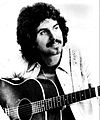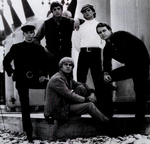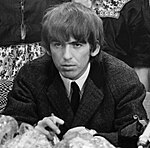Portal:Rock music
The Rock Music Portal
Rock is a broad genre of popular music that originated as "rock and roll" in the United States in the late 1940s and early 1950s, developing into a range of different styles from the mid-1960s, particularly in the United States and the United Kingdom. It has its roots in rock and roll, a style that drew directly from the black musical genres of blues, rhythm and blues, and country music. Rock also drew strongly from genres such as electric blues and folk, and incorporated influences from jazz and other musical styles. For instrumentation, rock is typically centered on the electric guitar, usually as part of a rock group with electric bass guitar, drums, and one or more singers. Usually, rock is song-based music with a 4
4 time signature and utilizing a verse–chorus form, but the genre has become extremely diverse. Like pop music, lyrics often stress romantic love but also address a wide variety of other themes that are frequently social or political. Rock was the most popular genre of music in the U.S. and much of the Western world from the 1950s to the 2010s.
Rock musicians in the mid-1960s began to advance the album ahead of the single as the dominant form of recorded music expression and consumption, with the Beatles at the forefront of this development. Their contributions lent the genre a cultural legitimacy in the mainstream and initiated a rock-informed album era in the music industry for the next several decades. By the late 1960s "classic rock" period, a few distinct rock music subgenres had emerged, including hybrids like blues rock, folk rock, country rock, Southern rock, raga rock, and jazz rock, which contributed to the development of psychedelic rock, influenced by the countercultural psychedelic and hippie scene. New genres that emerged included progressive rock, which extended artistic elements, heavy metal, which emphasized an aggressive thick sound, and glam rock, which highlighted showmanship and visual style. In the second half of the 1970s, punk rock reacted by producing stripped-down, energetic social and political critiques. Punk was an influence in the 1980s on new wave, post-punk and eventually alternative rock.
From the 1990s, alternative rock began to dominate rock music and break into the mainstream in the form of grunge, Britpop, and indie rock. Further fusion subgenres have since emerged, including pop-punk, electronic rock, rap rock, and rap metal. Some movements were conscious attempts to revisit rock's history, including the garage rock/post-punk revival in the 2000s. Since the 2010s, rock has lost its position as the pre-eminent popular music genre in world culture, but remains commercially successful. The increased influence of hip-hop and electronic dance music can be seen in rock music, notably in the techno-pop scene of the early 2010s and the pop-punk-hip-hop revival of the 2020s. (Full article...)
General images -
Selected article
The band was signed to Reprise Records in 1966 and released their first single, "Ain't It Hard", in the latter part of the year. Their first album, The Electric Prunes, included the band's two nationally charting songs, "I Had Too Much to Dream (Last Night)" and "Get Me to the World on Time". With the appearance of their second album, Underground, the band was more free to create their own material. However, the original group disbanded by 1968 when they proved unable to record the innovative and complex arrangements by David Axelrod on the albums Mass in F Minor and Release of an Oath. Both albums were released under the band's name, the rights to which were owned by their record producer David Hassinger, but were largely performed by other musicians. Several of the original band members reconvened in 1999 and began recording again. The band still performs occasionally, although the only remaining original member is lead singer James Lowe. (Full article...)
Selected biography
Although most of the band's songs were written by John Lennon and Paul McCartney, most Beatles albums from 1965 onwards contained at least two Harrison compositions. His songs for the group include "Taxman", "Here Comes the Sun", "Within You Without You", "While My Guitar Gently Weeps" and "Something". Harrison's earliest musical influences included George Formby and Django Reinhardt; subsequent influences were Carl Perkins, Chet Atkins and Chuck Berry. By 1965, he had begun to lead the Beatles into folk rock through his interest in Bob Dylan and the Byrds, and towards Indian classical music through his use of Indian instruments, such as the sitar, which he had become acquainted with on the set of the film Help!. He played sitar on numerous Beatles songs, starting with "Norwegian Wood (This Bird Has Flown)". Having initiated the band's embrace of Transcendental Meditation in 1967, he subsequently developed an association with the Hare Krishna movement.
After the Beatles disbanded, Harrison released the triple album All Things Must Pass, a critically acclaimed work that produced his most successful hit single, "My Sweet Lord", and introduced his signature sound as a solo artist, the slide guitar. He also organised the 1971 Concert for Bangladesh with Indian musician Ravi Shankar, a precursor to later benefit concerts such as Live Aid. In his role as a music and film producer, Harrison produced acts signed to the Beatles' Apple record label before founding Dark Horse Records in 1974. He co-founded HandMade Films in 1978, initially to produce the Monty Python troupe's comedy film The Life of Brian (1979).
Harrison released several best-selling singles and albums as a solo performer. In 1988, he co-founded the platinum-selling supergroup the Traveling Wilburys. A prolific recording artist, he was featured as a guest guitarist on tracks by Badfinger, Ronnie Wood, and Billy Preston, and collaborated on songs and music with Dylan, Eric Clapton, Ringo Starr, and Tom Petty. Rolling Stone magazine ranked him number 31 in their 2023 list of greatest guitarists of all time. He is a two-time Rock and Roll Hall of Fame inductee – as a member of the Beatles in 1988, and posthumously for his solo career in 2004. (Full article...)
Selected album
Moondance is the third studio album by Northern Irish singer-songwriter Van Morrison. It was released on 27 January 1970 by Warner Bros. Records. After the commercial failure of his first Warner Bros. album Astral Weeks (1968), Morrison moved to upstate New York with his wife and began writing songs for Moondance. There, he met the musicians who would record the album with him at New York City's A & R Studios in August and September 1969.
The album found Morrison abandoning the abstract folk jazz compositions of Astral Weeks in favour of more formally composed songs, which he wrote and produced entirely himself. Its lively rhythm and blues/rock music was the style he would become most known for in his career. The music incorporated soul, jazz, pop, and Irish folk sounds into songs about finding spiritual renewal and redemption in worldly matters such as nature, music, romantic love, and self-affirmation.
Moondance was an immediate critical and commercial success. It helped establish Morrison as a major artist in popular music, while several of its songs became staples on FM radio in the early 1970s. Among the most acclaimed records in pop/rock history, Moondance frequently ranks in professional listings of the greatest albums. In 2013, the album's remastered deluxe edition was released to similar acclaim. (Full article...)
Selected song
"Rain" is a song by the English rock band the Beatles, released on 30 May 1966 as the B-side of their "Paperback Writer" single. Both songs were recorded during the sessions for Revolver, although neither appear on that album. "Rain" was written by John Lennon and credited to the Lennon–McCartney partnership. He described it as being "about people moaning about the weather all the time".
The song's recording contains a slowed-down rhythm track, a droning bass line and backwards vocals. Its release marked one of the first times that reversed sounds appeared in a pop song, although the Beatles used the same technique on the Revolver track "Tomorrow Never Knows", recorded days earlier. Ringo Starr considers "Rain" his best recorded drum performance. Three promotional films were created for the song, and they are considered among the early precursors of music videos. (Full article...)
Selected picture

Watercolour portrait of David Bowie by Ines Zgonc.
Did you know (auto-generated)

- ... that Skálmöld & Sinfóníuhljómsveit Íslands documents a symphony orchestra playing heavy metal music?
- ... that before charting on the UK Albums Chart with Are We There Yet?, the indie rock musician James Marriott had made a career of mocking other YouTubers' music?
- ... that raw material waste from the West influenced a generation of rock music in China?
- ... that Canadian punk rock musician Talli Osborne had only briefly spoken to the frontman of NOFX before the band wrote a song about her?
- ... that the Liverpool Echo described British rock and roll star Tommy Steele as "quite unable to sing and play the guitar at the same time" when reviewing his first album?
- ... that the heavy metal band Cradle of Filth released a T-shirt that was so offensive that several people were arrested for wearing it?
Selected genre
Post-Britpop is an alternative rock subgenre and is the period in the late 1990s and early 2000s, following Britpop, when the media were identifying a "new generation" or "second wave" of guitar bands influenced by acts like Oasis and Blur, but with less overt British concerns in their lyrics and making more use of American rock and indie influences, as well as experimental music. Bands in the post-Britpop era that had been established acts, but gained greater prominence after the decline of Britpop, such as Radiohead and the Verve, and new acts such as Keane, Snow Patrol, Stereophonics, Feeder, and particularly Travis and Coldplay, achieved much wider international success than most of the Britpop groups that had preceded them, and were some of the most commercially successful acts of the late 1990s and early 2000s. (Full article...)
Selected audio
Related portals
WikiProjects
Things you can do
Expand: College rock, Electronic rock, Pop rock
Clean Up: Instrumental rock, Rap rock, New wave, Industrial rock, Progressive metal, Southern rock, Folk rock, Funk rock, Space rock
Add Sources: Pagan rock
Join one of the many WikiProjects pertaining to Rock music.
News
No recent news
More articles -
"De la capăt" (Romanian for 'From the beginning'; cfr. "da capo") is a song recorded by Romanian group Voltaj for their tenth studio album X (2016). It was made available as a single for digital download on 31 October 2014 by Cat Music and Voltz Media. A Romanian song, two other versions were released eventually—"De la capăt (All Over Again)" in Romanian and English, and "All Over Again" fully in English. "De la capăt (All Over Again)" was written by band members Călin Goia, Gabriel Constantin and Adrian Cristescu with Silviu Marian Păduraru and Victor Răzvan Alstani, while music was composed by the aforementioned alongside Monica-Ana Stevens and Andrei-Mădalin Leonte. "De la capăt" has been described as an indie pop rock and soft rock song, and is a manifesto raising awareness for children whose parents have left them behind to work abroad.
"De la capăt (All Over Again)" represented Romania in the 2015 Eurovision Song Contest in Vienna, Austria after winning the pre-selection show Selecția Națională. The country went on to reach 15th place in a field of 26, scoring a total of 35 points. During Voltaj's minimalistic and mostly black-and-white show, the stage was scattered with multiple suitcases while excerpts from the music video were shown on the background LED screen. "De la capăt" received mixed reviews from music critics, with praise for the song's message and lyrics, as well as for band soloist Goia's vocal delivery. Observers have compared the track to "I Could Sing of Your Love Forever" (1995) by Delirious?. It won in the Best Pop Rock Song category at the 2015 Radio România Actualități Awards. (Full article...)
More did you know...
- ... that David Bowie's first gig as lead singer was at the Green Man, Blackheath?
- ... that Carlton le Willows Academy alumni include cricketer Mark Footitt, Air Supply singer/guitarist Graham Russell, and balloonist Janet Folkes?
- ... that the video for Marilyn Manson's soft-rock ballad "Running to the Edge of the World" was widely condemned for its depiction of violence against women?
- ... that Susan Beschta was a punk rocker and federal judge?

- ... that the FM Non-Duplication Rule adopted by the FCC 60 years ago led to the creation of the album-oriented and classic rock radio formats?
- ... that The Elvis Dead, a retelling of Evil Dead II in the style of Elvis Presley, features songs such as "Standing in a State of Shock", "I've Been Possessed", and "Wrapped Up in Vines"?
Major topics
Subcategories
Associated Wikimedia
The following Wikimedia Foundation sister projects provide more on this subject:
-
Commons
Free media repository -
Wikibooks
Free textbooks and manuals -
Wikidata
Free knowledge base -
Wikinews
Free-content news -
Wikiquote
Collection of quotations -
Wikisource
Free-content library -
Wikiversity
Free learning tools -
Wikivoyage
Free travel guide -
Wiktionary
Dictionary and thesaurus



















































